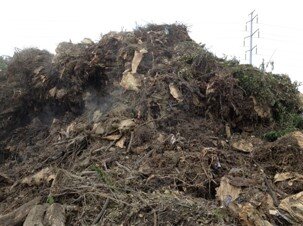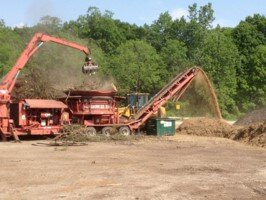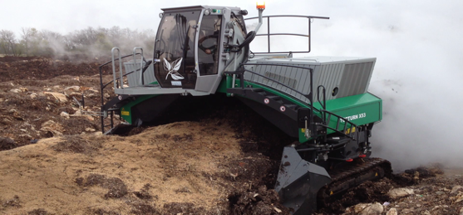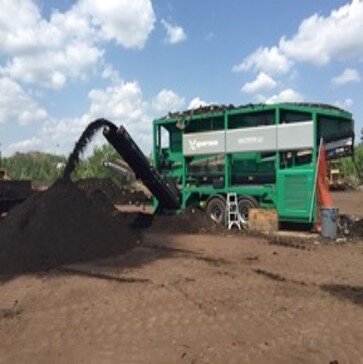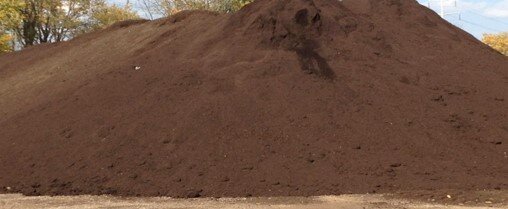Expanding Composting Operations: City of Ann Arbor’s Green and Food Waste Recycling Program
The Setting
It’s no secret that the City of Ann Arbor has been seeding the movement of sustainable materials management for the State of Michigan since the 1970’s. Over the years the city converted a closed landfill site to a material recovery campus called the W.R. Wheeler Service Center and continuously worked to expand and upgrade the site’s capabilities. When it comes to organics, the city began composting yard clippings and leaves decades before the state’s yard waste landfill ban went into effect in 1995. In 2005 they expanded the site to include a fully engineered composting facility, an expanded single stream material recovery facility (MRF), and a stand-alone transfer station. The compost facility expansion of 2005 took the site from 10 acres to over 25 acres of an engineered compost pad, including enhanced stormwater runoff control, use of a recovered waste material (slag) for pad construction, and development of an equipment maintenance facility and operating office.
The Challenge
Although the City of Ann Arbor operated the composting facility for many years with minimal overhead, it began to face higher operating costs as material volumes grew and more sophisticated equipment was needed to collect, operate, and maintain the facility. The City had to find ways to continue to provide the endeared, valuable resource of compost to its community while being able to sustain the operation.
The Solution
In 2009, the City undertook a market-based assessment of composting operations. Using the public-private contracting approach implemented for both the MRF and transfer station, the City determined that compost operations could be carried out more efficiently by a private sector operator. The outcome of this two-year process was the selection of a private service provider, WeCare Organics, now WeCare-Denali (WeCare), to manage the facility and operations starting in 2011. WeCare’s primary focus is the development, operations, and management of composting facilities throughout the United States. WeCare produces compost that is certified by the US Composting Council (USCC) Seal of Testing Assurance (STA) program and is an active member of the Compost Manufacturing Alliance (CMA) which provides industrial composting facilities an acceptance standard for compostables by performing field disintegration testing to ensure products sent to industrial compost facilities adequately break down within the production cycle.
The objectives for contracting of the facility focused on:
Facility operation,
Compost and mulch products marketing and sales, and
Sourcing of additional third-party generated organics (such as food waste from the University of Michigan) for which incoming waste revenue and product sales revenue are shared with the City.
The program is now stronger than ever and demonstrates the value of public-private partnerships to provide communities with the benefits of broad materials management, including organic waste.
Below is a timeline highlighting the evolution of this program.
Timeline
-
1970s
Leaf collection and management at the City airport property (current location of Project Grow Community Gardens).
-
1980s
Phase I compost site at the City closed landfill commences with tub grinding capability.
-
1988
City curbside compostable collection begins with “soft” yard trimming materials.
-
1990
City environmental bond passes enabling a dedicated operating and capital fund focused on recovery of waste.
-
1992
City purchases windrow turner and other equipment for composting facility and curbside collection expands to formally accept brush.
13% of total waste generated in Ann Arbor is diverted through composting = 6,800 tons.
-
1997
City and University of Michigan partner for the University to self-haul food waste from dining hall kitchens to the City’s compost site.
-
2002
City starts a downtown restaurant vegetative prep-waste collection pilot, 3 timers per week, co-collected with residential yard trimmings.
-
2003
City Council directed that the closed landfill, now re-designated The Swift Run Center, would become the location for the City’s Service Center and the solid waste recovery campus, requiring significant rezoning and cooperation between the City and Pittsfield Township.
-
2006
City expands the vegetative food trimmings collection into the seasonal residential yard trimmings cart weekly pickups.
University of Michigan program expands to all dining halls and some special events/athletics events.
-
2007
Compost phase II fully opens, with a new 17- acre composting facility in addition to a new MRF, upgraded scale capability, and a stand-alone transfer station.
-
2009
Market-based assessment of composting operations begins. Public-Private contracting approaches are evaluated.
-
2010
City issues organics curbside carts to all single family and duplex residents and ends street leaf collection.
-
2011
WeCare Organics assumes control over operations of the City composting facility. They provide support for the successful implementation, receiving, processing, and marketing of the resulting products with particular attention to creating high quality material that can be sold to the nursery, landscaping, and soil amendment industries.
-
2014
City kicks off the Residential Food Scraps Collection Program (“RFSCP”), including plate scrapings (includes meat, bones, dairy, as well as food-soiled paper and BPI-Certified compostable foodservice packaging).
WeCare partners with the University of Michigan zero waste initiative to process food waste from athletic facilities.
-
2020
City Council passes A2Zero Plan for carbon neutrality that recognizes the carbon benefits of organics recovery through composting.
City Council passes the 2019-2023 Solid Waste Resource Management Plan that discusses options to increase organics recovery including a City commercial compost collection program with the potential to divert 1,000 – 2,400 tons per year.
17% of total waste generated in Ann Arbor is diverted through composting = 12,000 tons.
The Results
Benefits of utilizing a private contractor for managing organic processing for the City of Ann Arbor include:
Recovery Focus – The City’s commitment to composting and beneficial use of organic waste generated within Ann Arbor and southeastern Michigan continues to be a priority.
Economic Efficiency – Long-term cost savings are appropriately balanced with operational excellence and regulatory compliance.
Administrative Efficiency – Facility operation, material transportation, product marketing, and other operational services are conducted by one vendor and create a one-stop-shop for City organics recycling transactions.
Environmental Benefit – Maintaining beneficial use and organics recycling in the City fulfills a key component of its A2ZERO Strategy.
Shared Advocacy – WeCare has successfully worked with the City, compost stakeholders, the Compost Council of Michigan (CCM), the Michigan Recycling Coalition (MRC), and the Michigan Department of Environment, Great Lakes and Energy (EGLE) to successfully defeat repeated efforts within the state legislature to eliminate the yard waste ban in Michigan landfills.

